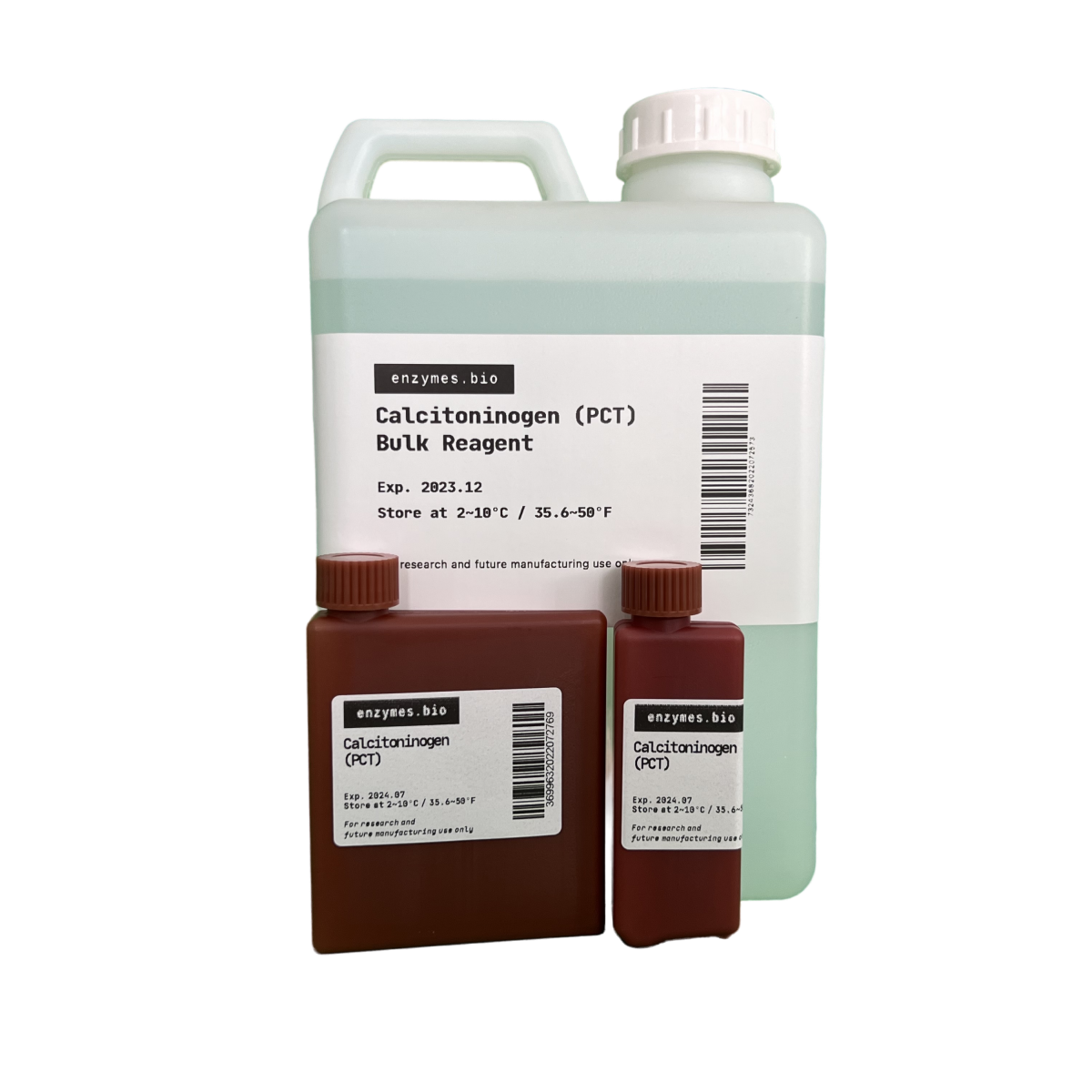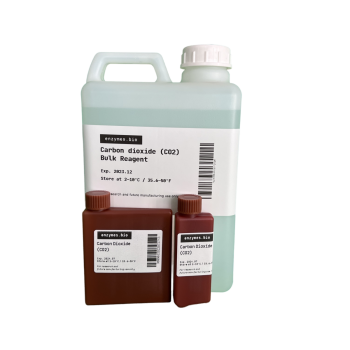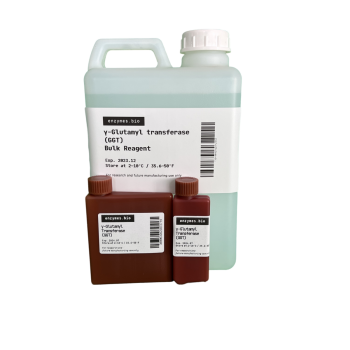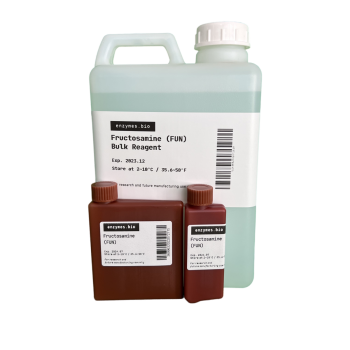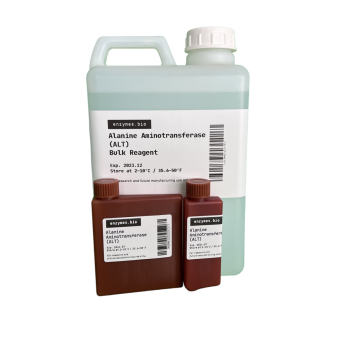Selling unit: per 100ml
Product Name
- Common name: Calcitoninogen (PCT) assay kit (latex-enhanced immunoturbidimetric assay)
- English name: Procalcitonin assay kit (Immunoturbidimetric Method)
Reagent Ratio
3:1
Intended Use
This kit is used for the in vitro quantitative determination of calcitoninogen (PCT) in human serum or plasma.
PCT, also known as procalcitonin, is an important parameter in the diagnosis and monitoring of infections in bacterial inflammatory diseases. PCT measurement can be used as an acute parameter for differential diagnosis of bacterial and non-bacterial infections and inflammatory diseases; monitoring patients at risk of infection and those requiring intensive care; detecting systemic effects of bacterial infections or detecting septic complications; and evaluating the clinical course of severe inflammatory diseases and prognosis of severe inflammatory diseases.
Test Principle
The PCT in the sample reacts with the sensitized latex particles of the sheep anti-human PCT antibody in the phosphate buffer system, and agglutinates with polyethylene glycol as an agonist to increase the turbidity, and the change in absorbance of the reaction solution at 600 nm is proportional to the amount of PCT in the sample.
Main Components
Reagent components included in the product.
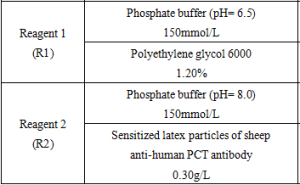
*Components are not interchangeable in kits with different lot numbers.
*Reagent components not included in the product, but necessary for the test: outsourced normal and abnormal QCs and calibrators.
Storage Conditions And Expiration Date
The kit is stored at 2-8°C away from light and is valid for one year.
Reagents that have been opened are careful not to be contaminated, and reagents are stable in the instrument compartment (2-8°C) for one month.
The reagents must not be frozen.
Applicable Instruments
Hitachi 7180/7600; Olympus AU680/2700; Toshiba TBA120; Myriad BS2000M/480; Siemens ADVIA 1800/2400 series automatic biochemical analyzers.
Sample Request
- When testing, blood samples without heparin anticoagulation shall be analyzed out of serum; blood samples anticoagulated by heparin, plasma can be used.
- Serum or plasma can be stored at 2 to 8°C for 48 hours; can be stored at -20°C or below for six months. Avoid heating to inactivate samples; hemolyzed samples should be discarded.
- The sample must be returned to room temperature before testing. Frozen samples should be completely thawed, rewarmed and mixed well before use, do not repeatedly freeze and thaw.
Test Method
- Reagent preparation: liquid reagents are ready to use out of the bottle.
- test conditions: (different parameters on the machine can be requested according to different testing instruments)
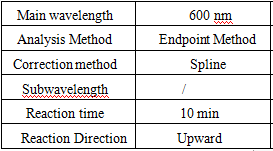
Operation steps.
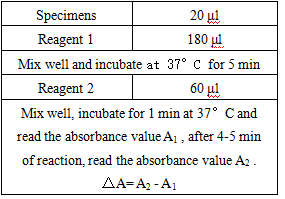
Reagents and sample volumes can be increased or decreased in proportion to the requirements of different biochemical analyzers.
- Calibration procedure.
The use of matching calibrators is recommended.
- QC control procedures.
It is recommended that each laboratory establish its own quality control system and select appropriate quality control products for quality control. The measured values of QC products should be within the specified range. If outside the specified range, it is necessary to take appropriate measures or contact the manufacturer.
- Calculation.
Sample concentration = △A×calibrator concentration
Positive Judgment Value Or Reference Interval
0-0.5 ng/ml
It is recommended that each laboratory establish its own reference range of normal values.
Interpretation Of Test Results
Hemoglobin ≤ 400 mg/dL, ascorbic acid ≤ 30 mg/dL and bilirubin ≤ 40 mg/dL will not interfere with this test.
Limitations Of The Test Method
The determination of PCT in human serum or plasma is only one of the indicators used by the clinician to make a diagnosis of the patient. The clinician must also make a comprehensive judgment based on the patient’s physical symptoms, medical history, as well as other diagnostic items and diagnostic tools.
Product Performance Index
Absorbance of reagent blank: wavelength 500 nm, optical diameter 1.0 cm, temperature 37°C, A0 ≤ 1.5.
Analytical sensitivity: The kit tests 2.5 ng/mL of the analyte with absorbance change value ΔA ≥ 0.025.
Linearity range: test serum samples, reagent linearity in the interval of 0.05-80.0 ng/ml, linear correlation coefficient|r| should not be less than 0.990; in the interval of 0.05-20.0 ng/mL, the absolute deviation of linearity should not exceed 4ng/mL; in the interval of (20.0-80.0 ng/mL, the relative deviation of linearity should not exceed ±10%.
Precision: repeatability CV≤ 8.0%; relative extreme difference between batches≤ 12.0%.
Accuracy: Relative deviation ≤ 10%.
Caution
- This product is for in vitro diagnosis only.
- Avoid contamination when using the reagent, the container used must be clean, and please take necessary precautions, do not swallow, and avoid contact with skin and mucous membrane.
- Please dispose of the measured samples and waste liquids in accordance with the relevant national and local laws and regulations.
- When changing the reagent lot number, the calibration should be re-calibrated.
- If the concentration of calcitoninogen in the sample exceeds 80 ng/ml, the sample should be diluted with saline and then measured at a maximum dilution of 4 times, with an upper limit of 320 ng/ml after dilution.
- Do not mix kits of different lot numbers and reagents left after use.
Reference
Clinical Laboratory Management and Technical Protocols Lu Yongsui Zhang Weiming
